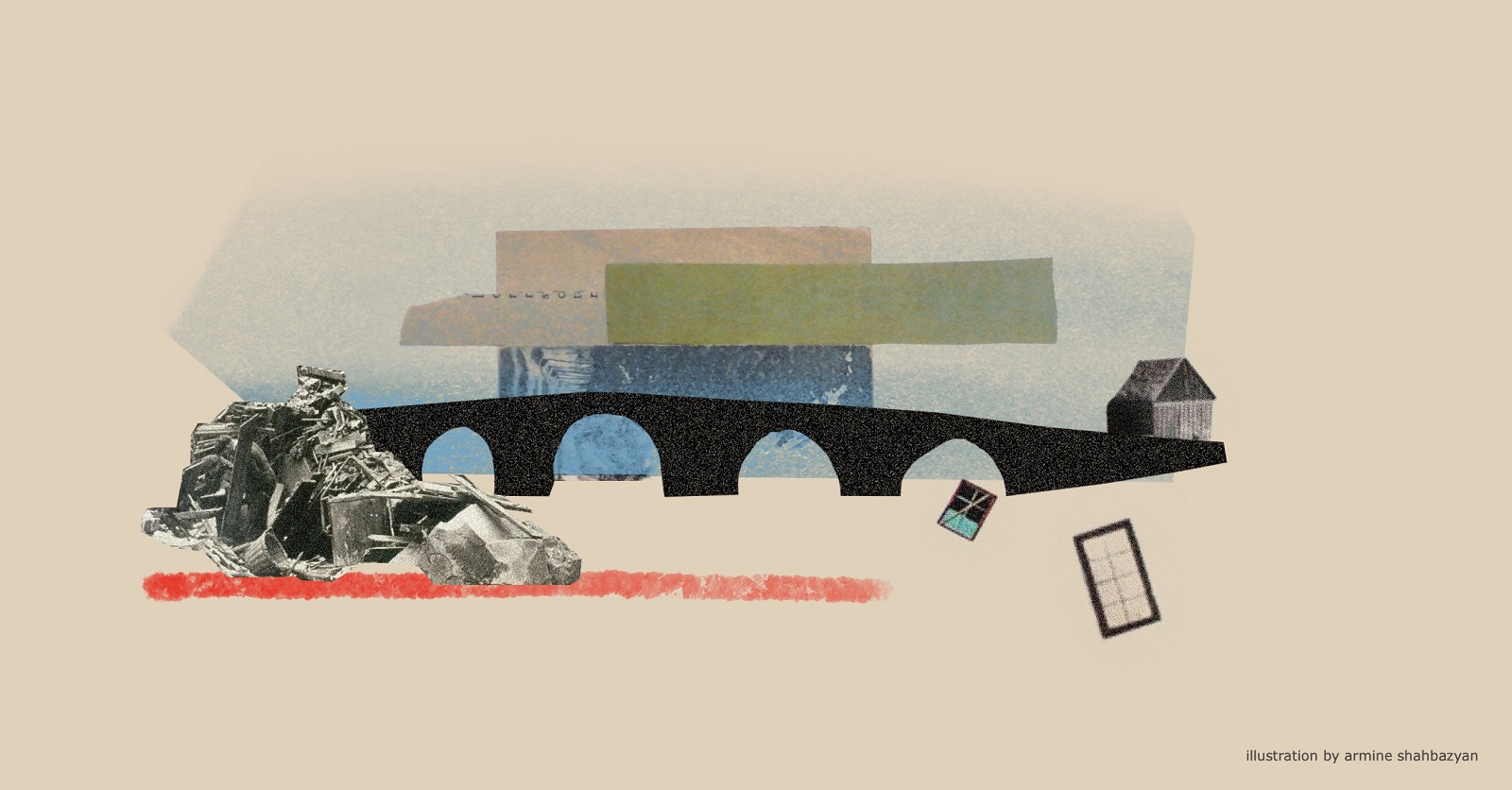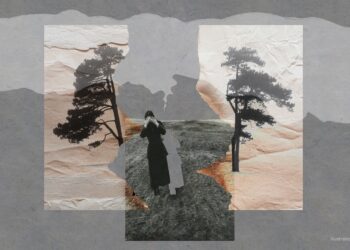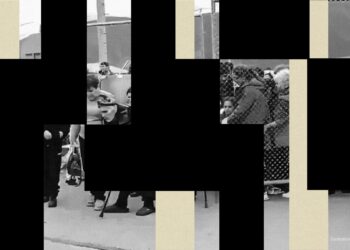
Listen to the article.
There is a loud explosion. I jump up. Then another and with it, I see fireworks from my window and hear the excitement of the children. I repeat to myself, “Fireworks, not explosions, not an aerial attack.”
My conscious mind tries to get used to loud, unexpected sounds. No need to jump up and panic every time. Yet, my whole being is resisting. My subconscious and my body are not adjusting.
My body and subconscious remember the explosions from a year ago—Stepanakert, September 19, 2023. The last, lethal explosions in Artsakh. That final assault somehow overwrites the memory of the long days and weeks of various caliber of explosions in 2020. The September 19 attack is vicious, decisive, and deadly. It is final and detrimental for Artsakh, final and detrimental for many of our beliefs and sentiments.
That day, I had walked from our house on the outskirts of Stepanakert to the center, hoping to buy a few necessities and take care of some work. I returned home around noon to the house we had moved to after being displaced from Karvajar, on the outskirts of the city, almost outside the city. I settle in front of my computer and try to work.
At 1:09 p.m., the first bomb explodes next to our house. I’m replying to an email from a colleague. I barely register the initial explosion, but within milliseconds, I realize that this is not the sound of demining or thunder. I think to myself, “Let me send this email and figure out what that was.” As I press “send,” the second explosion causes the windows to fly open, shattering the glass water bottles on the window sill. It is clearly an attack—powerful, final, and destructive.
In the minutes that follow, I try to reach my husband. We manage to talk for a few seconds, nowhere near enough time to understand what needs to be done. Then the phone line and electricity cut off.
This is it—you’re alone on the edge of a city where you don’t even know your neighbors. You’re alone with the bombs, the endless, final, lethal explosions. You need to start making decisions; panic is a poor companion in situations like this.
By some miracle, I manage to reach the center. There, the end of the world has begun. People are running in all directions under intensifying bombardment. Cars have appeared in the city, running on fuel saved for doomsday. It is the last day; the last day of Artsakh. The explosions roar through the night and only stop at 1 p.m. the next day, delivering the message clearly: This is the end. You have no Artsakh; best leave this place alive.
On September 20, the reign of uncertainty begins. Miserable days filled with dread and uncertainty stretch on, minutes extend as long as years. Time stands still as we watch a soldier set fire to his uniform decorated with medals—the end of Artsakh’s defense symbolized in the flames consuming inventory from the military command headquarters. It is the end of the ever-clean and tidy Stepanakert, the end of the villages of Artsakh as displaced residents arrive in Stepanakert from their invaded homes, in utter uncertainty.
It is clear we should leave if we can. The contradictory, vague, and markedly confusing state announcements signal that no state institution cares about the fate of a hundred thousand people—not in Stepanakert (they had disappeared into the bombarded air) and not in Yerevan. The blue passport I cherish in my backpack means nothing. In this moment, I am no one’s citizen; I am just a person trying to survive.
We head home one last time, on foot. We know we will take nothing with us. We just don’t want to leave the most personal items behind. We look around with an undecided gaze. The unwashed laundry is in the washing machine. It will stay there. A couple of dishes in the sink. Some clothes on the back of the chair, some in the closet. Books on the shelves. None of it is necessary. We’re not taking anything. It’s pointless. We are leaving Artsakh behind. In light of this thought, everything else loses value. We take a couple of photographs, a few hard drives, a book a colleague had gifted me—the inscription is too significant. We lock the door; we don’t destroy anything. The landlady, before leaving for Yerevan in a Red Cross ambulance a week ago, had instructed us to pick the fruit in the garden, not to let it spoil. She told us to make wine out of the grapes. There will be no wine this year. The wine from last year was really good; it helped during the cold and desolate winter in the blockade.
We take the familiar road back to the center of Stepanakert for the last time.
We head out.
…Towards Shushi, no, to the Hakari bridge.
The final, most destructive “blast” detonates at the Hakari bridge, 14-15 hours after leaving Stepanakert. A prolonged, daunting last explosion. The Azerbaijani soldiers do not speak much. A couple of minutes pass, and it’s done, we can go. My unwavering decision to move to Artsakh from Vanadzor in 2012 is undone. I’m in Kornidzor. Armenian border guards and volunteers greet us, register us, and offer us a chocolate wafer.
“No, thank you.”
The last explosion, crossing the bridge with no return, is indeed final. Artsakh is behind you, and you are here, in safety but with a thousand internal mines that will explode sooner or later. They will explode unexpectedly, without warning or permission. They’ll explode, and slowly you’ll crumble. They’ll be triggered by an innocent question like, “How are you?” or “How are you settling in?” They’ll go off from lyrics to a song, a glance at a mountain, a single note of the Artsakh dialect.
A year without Artsakh. Final, detrimental. A year with Artsakh kept inside, firmly.
There’s no time to steep in the depths of pain when you have lost your home twice. You need to recover, wipe away the tears, “come to terms,” because “life goes on.”
Life goes on. You pack away your memories and feelings, learning to live in a new reality—one without the most cherished part of your motherland, without your big dreams. It’s a reality where speaking too often about your loss becomes redundant; you bore people, you spoil their mood. A reality where you are often not fully understood, though the effort is truly genuine. A reality where fireworks are no longer triggering—God willing, they never will be again.
A year after the final loss of Artsakh, four years past the destructive war, you’re again standing before a half-finished house, trying to rebuild again, hoping it’s for the last time. This time, you’re indifferent about the shape of the roof and the color of the walls. And yet, looking out from the window, you search for shapes and colors that remind you of the view from the house you left in Karvajar. You are thankful that you live in a city nestled in the mountains.
The advice to “come to terms”, ”adjust,” or ”let go”, detonate the mines inside you, and they explode. Yet, in a fleeting moment of tranquility, a hopeless glimmer of hope begins to fight for existence. One day, you’ll stand again in front of your half-ruined home in Artsakh, lovingly designing its roof and choosing the color of its walls. You’ll survive all the final, lethal explosions. In that fleeting moment of calm, you do everything to keep that fragile spark of hope alive.
Spotlight Artsakh
Giving Birth in the Clutches of Blockade and Displacement
During the ten-month blockade of Artsakh, hundreds of pregnant women endured fear and deprivation instead of experiencing the joy of approaching motherhood. Photojournalist Ani Gevorgyan chronicles their challenges.
Read moreMonologues: The Homes They Lost in Artsakh
“The story of the house began with a smile and ended with tears,” writes Yan Shenkman, a Russian journalist, who moved to Armenia after the war in Ukraine started. He compiled monologues from the Armenians of Nagorno-Karabakh for an upcoming exhibition about the homes they lost.
Read morePolitics
Ethnic Cleansing, Genocide or Displacement?
This article explores the most accurate term to describe the de-Armenization of Nagorno-Karabakh by comparing various perspectives and examining the legal and political applicability of these terms.
Read moreArtsakh Heritage: What Is Happening to Nagorno-Karabakh’s Armenian Monuments
Following Azerbaijan’s ethnic cleansing of Artsakh, the issue of the preservation of Armenian monuments has again become a hot topic. EVN Report spoke with Simon Maghakyan, an academic and investigative researcher to provide updates and insights.
Read more





When my parents lost everything in Baku in ‘88, except for me and their lives, my father told my mom that he would build her a house in America one day. Everyone laughed at him. How would you get to America? When my mother was feeling hopeless or had moments of despair, he would ask her what color brick she preferred or what type of windows their home should have. 10 years later, my parents were living in America, and my father built that house they had designed in their minds, as refugees, stateless people. So now I ask you: what type of roof will your home have? After all, we are returning…